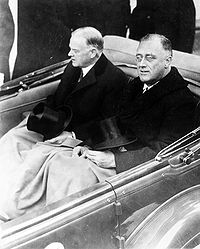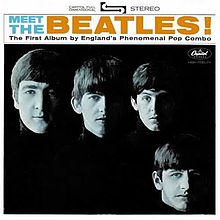|
Is time slowing?
(In a comment, I offer a possible explanation for this phenomenon.)

 The same duration separates FDR’s inauguration from the release of the Beatle’s first LP as separates Ronald Reagan’s election from the present moment, though the former duration seems much longer.
Or look at it this way. We are now farther in time from the election of John F. Kennedy, than the election of Kennedy was from the election of Woodrow Wilson—two years before the beginning of the First World War!)
I reflected this weekend that we are now as far from the inauguration of Ronald Reagan (30 years) as the inauguration of Reagan was from the Korean War and the final two years of Truman.Gintas writes:
When you’re young the days are short and the years are long. When you’re old the days are long and the years are short. So the answer to your question is “yes and no.”James R. writes:
I don’t think time is slowing it’s just that progressivism is so firmly entrenched it now seems established, so many of the changes it wrought seem old now. But if you look at the other things they continue to do, it seems to be speeding up. For example it’s almost a guarantee that at the Republican Convention of 2020, if not 2016, there will be married homosexual military couples giving speeches and/or introductions, on display as an example of Republican family values and inclusiveness. (Unless something radical changes in the meantime).James R. continues:
Here’s a cheering thought if you’re worried that time is slowing: Probably in 2020, if not 2016, Chaz Bono will give the Keynote Speech at the Republican Convention, and talk about how supportive Sonny Bono (R—CA) always was of Chaz’s choices.LA replies:
Maybe it’s like this. Our sense of the amount of lapsed time between two events is a function, not of the amount of chronological time between them, but of whether the two events occurred during the same cultural era or in different cultural eras. Two events that both occurred since the onset of the counterculture, i.e., in the same era in which we find ourselves, will seem close in time to each other. Two events that occurred before and after the onset of the counterculture will seem much farther from each other. For example, it feels odd to us that as much chronological time has passed between the election of Ronald Reagan and this moment, as between the inauguration of Franklin Roosevelt and the Beatles’ first LP. The time between Reagan’s election and now (31 years—from November 1980 to November 2011) feels relatively short, because the election of Reagan took place in the same cultural era in which we are still living, while the time between Roosevelt’s inauguration and the Beatles’ first LP (30 years and ten months—from March 1933 to January 1964), feels much longer, because the two events took place in different cultural eras.LA adds:
But maybe I’m wrong about this. Maybe the sense of greater elapsed time between two events is not a function of the two events being in two cultural eras, but of the first event preceding one’s own personal memories. Maybe the Roosevelt-Beatles gap seems greater to me simply because Roosevelt was before my time (and thus seems farther in the past), and the Beatles weren’t, while Reagan’s election is in my time as is the present moment.Paul T. writes:
It’s certainly a disconcerting feeling, and the more examples one comes up with, the stranger it all seems. I have some fairly clear memories of 1960, but find it hard to wrap my mind around the plain fact that at that time there were still many people alive who had even clearer memories of the Victorian period. Many of these late Victorians lived to hear JFK’s announced goal of landing a man on the moon and returning him safely to earth before the decade was out. And when my cousin Al Jolson starred in The Jazz Singer, only about thirty years before that, there were plenty of Civil War veterans walking around. My mother knew Jolson’s sister very well, though there must have been quite an age difference between them.LA replies:
It’s not clear what you find disconcerting.Paul T. replies:
Like most people (I suspect), I tend to divide history into periods—Civil War, post-Civil War, Great Depression and so on, and to populate each period with its own characteristic sets of people: the bright young things of the ’20s, the people of the Eisenhower years, etc. These divides are analytically useful, but they ignore the fact that a human life is often long enough to fall across periods, so that a Victorian could live to see space travel, or someone present at FDR’s inauguration could also have seen Jim Morrison perform. As you point out, it’s not just the passage of years that make these juxapositions so striking, it’s the fact that those years embody dramatic cultural shifts. Someone whose life falls between periods seems to be living in two or more different worlds or dimensions. It’s a real-life parallel to some fanciful, time-travel-based episode of The Outer Limits or The Twilight Zone. And to me, that’s somewhat eerie.LA replies:
Right, so a person born in, say, 1885, who was 16 at the death of Queen Victoria and 29 at the outbreak of the Great War, would have been 84 at the time of the Moon landing.Tim W. writes:
It seems more as though it’s speeding up. I’ve always heard that the mental clock speeds up as we age. So if you’re seventeen, it seems like ages have passed since you were seven. Memories of a vacation you took when you were seven seem ancient. But if you’re forty-seven it seems like only yesterday when you were thirty-seven.Tim W. writes:
Could our mass immersion in video have something to do with the speeding up of time? When the great 1906 San Francisco earthquake hit, there was no TV. People nationwide eventually saw some newspaper photos of the devastation but there was no round-the-clock coverage. Only the people immediately affected by the quake truly remembered it years later. To most Americans it was a distant story with only a few available visual impressions. An earthquake that devastating today would feature video in continuous loop, available worldwide on every news channel plus internet videos which could be saved and played forever. It would be imprinted in everyone’s memory.November 29 Paul T. replies to LA: Yes, and that’s almost exactly my grandfather’s case—born in 1888 and lived to see John Glenn’s orbital flight. Mind-blowing, as we used to say…. !Wesley L. writes:
I just wanted to say that this is the most thought-provoking post I’ve read, here, in a long time. Very interesting.Dimitri K. writes:
It is a great observation of yours. I have also observed something. Being a physicist-chemist, I observed the lack of scientific discoveries in the last 50 years. Some people want to pretend that inventing the IPod is equal to inventing a rocket or Relativity theory, but it’s not. IPod is mainly a new design of an old computer. The last scientific hopeful named Global Warming seems to have died, and now everyone sees that the king is naked.November 30 Philip M. writes:
There have been occasions, often when looking at your site, that I have felt the seed of an idea or an insight that will not, no matter how long I turn it over in my mind, form into a bigger truth that I can easily express. I’m sure there is something interesting there, but it is like it is something that is just beyond my limitations. Do you know what I mean?LA replies:
There is a lot here. I’m going to have to return to your comment and think about it more. Also, I should mention Rodney Collin’s “The Theory of Celestial Influence,” which deals with issues of this nature, such as the relative time of existence in different scales, how time is different depending on the size of the entity. But it is not easy reading. Collin was a close student of Ouspensky’s. Posted by Lawrence Auster at November 28, 2011 11:22 AM | Send Email entry |